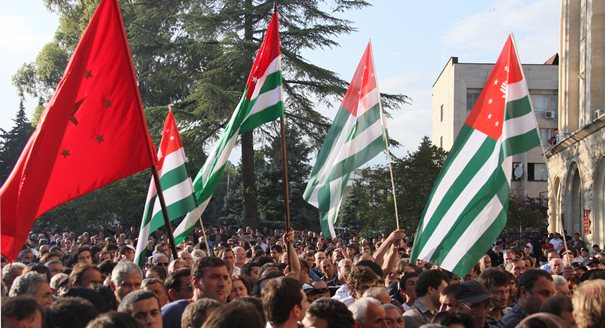Abkhazia is in crisis. Late on May 27, the opposition took over the presidential administration building and Abkhaz President Alexander Ankvab left the city. Later the Abkhaz parliament passed a resolution of no-confidence in the prime minister and called on the president to resign.
It is tempting to see the current crisis as a spillover from events in Ukraine. That would be a mistake. This is overwhelmingly a local crisis. For the past 20 years, since it de facto broke away from Georgia, Abkhazia has lived in a world of its own.
Since he was elected in 2011, Ankvab has alienated a lot of this political class with a reputation for being aloof and indifferent to their problems.
Ankvab has had a bad six months. The Sochi Olympics, which Abkhaz hoped would bring an economic boon to the republic, were a disappointment and actually produced the opposite effect.
Russia’s annexation of Crimea also means that Moscow now controls a much more strategically valuable and reliable slice of the Black Sea coast, which lessens Abkhazia’s relative importance. Russian state money and tourism revenues which might have gone to Abkhazia are now likely to be diverted to Crimea.
The opposition is a diverse group and hard to characterize. One die-hard nationalist Russian commentator, has alleged—incredibly—that they are the instigators of a Western-backed coup.
Others see them as being backed by Moscow as a more reliable alternative than the difficult Ankvab—although the truth is probably that both the president and opposition have their patrons in Russia.
Two things can be said about the opposition with certainty. One is that most of them are disgruntled for being shut out of political office. Opposition leader Raul Khajimba is the perpetual nearly-man of Abkhaz politics having failed to win the presidency in 2004, when he was backed by Moscow, and again in 2011—when he was not. These men have also lost out by not getting access to the republic’s limited economic resources. The recent announcement of plans for oil exploration off the Abkhaz coast may have especially enraged them.
The second common denominator about the opposition is that they are generally more ethno-nationalist. They have made waves over the issue of plans for distribution of Abkhaz passports to the up to 50,000 ethnic Georgians living an uncertain existence in Gali district adjoining western Georgia. They allege that these Georgians, most of whom also have Georgian passports, could become a “fifth column.”
The immediate focus in the coming days will be on whether Ankvab and the opposition can agree on a political solution, perhaps through early elections. A longer-term concern is that Gali does not become the location of a new political—or even worse physical—battleground.





